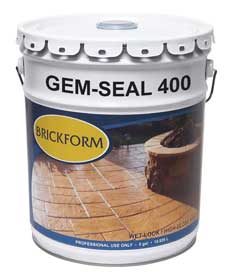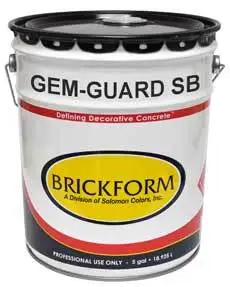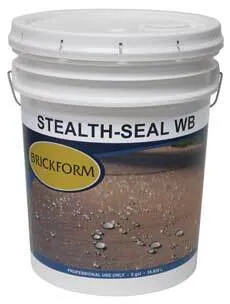How to Choose the Best Concrete Driveway Sealer for Any Job
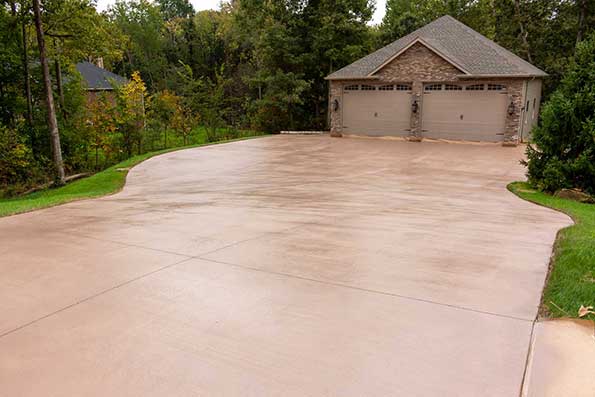
Protect your driveway
Sealing your concrete driveway is the best way to prevent wear and tear, tire marks, freeze-thaw damage and other issues. Brickform is a top manufacturer, offering a variety of high-quality concrete driveway sealer options. For expert insights on choosing the right sealer for your driveway, continue reading.
Understanding Concrete Driveway Sealers
You may already know that sealers protect concrete. But what is a concrete driveway sealer? A concrete driveway sealer, specifically, is a sealer that’s strong enough to withstand all the wear and tear that driveways need to endure.
What are the benefits of sealing a concrete driveway?
- Protects concrete against weather damage.
- Prevents chemicals or other contaminants from wearing away at the surface.
- Defends concrete against the wear and tear presented by tires and other heavy machinery.
- Enhances the appearance of concrete with a sheen (if desired).
- Increases the longevity of a concrete surface by protecting it from all these things and more.
Film-Forming versus Penetrating Sealers
What are the main types of concrete driveway sealers? There are two main categories: film-forming and penetrating.
- Film-forming concrete sealers change the appearance of the concrete. They create a glossy sheen that can range from subtle to very glossy.
- Penetrating concrete sealers don’t change the appearance of the concrete, though they sometimes add a slight gloss.
Film-forming acrylic sealers are more susceptible to tire marks, so some people opt for penetrating sealers instead.

Choosing the Right Sealer for Your Driveway
With so many concrete sealers for driveways available, it can be hard to know which is the best concrete driveway sealer for your project. So what type of driveway sealer is best for concrete? Choosing the right one depends on your needs. Here are some factors to consider when choosing a sealer:
- For a wet look, try Brickform’s Gem-Seal. This solvent-based, high-gloss, acrylic sealer just needs a light coating to provide protection from things like oil, grease, food stains, and more.
- For protection against mildew and dusting in addition to stains, try Brickform’s Poly-Seal. Made with high-quality acrylics, this is a durable, glossy sealer.
- For a no-gloss finish, try Brickform’s Stealth-Seal WB. This penetrating sealer creates an invisible barrier, protecting against freeze-thaw cycles, oil, water, and salt intrusion.
- For a low-sheen sealer, try Brickform’s Gem-Guard SB. This penetrating sealer enhances the color. While it does provide a sheen, it doesn’t create the glossy look of traditional film-forming sealers.
- For sealing a freshly poured driveway, use Gem Cure & Seal. This curing and sealing compound makes more durable concrete with higher compressive strength and better crack and freeze-thaw resistance.
Sealers for Driveways in Climates with Cold Weather & Snow
If you live in a snowy and cold area, you might need a sealer to protect your driveway from salt damage. Salt can cause cracking, spalling, and efflorescence. Gem-Guard SB (low sheen) and Stealth Seal WB (no sheen) are specifically formulated to protect concrete from salt damage.
Learn more about protecting your concrete from salt damage.
Removing Old Sealer
If you have a failing concrete sealer on your driveway, you might wonder: Can I apply a new sealer over an old one? No, you should not. The new sealer will not adhere to the surface properly and your new layer of sealer will likely chip and bubble. It won’t provide your concrete with adequate protection, either.
Instead, you can use a stripper such as Brickform’s Strip-It. Strip-It to remove existing sealer. Environmentally sound and user-safe, it meets the California Air Resources Board VOC standards.
Maintenance and Care
Even though sealers are the best way to protect and preserve your concrete driveway, it’s important to maintain your sealed driveway. The same goes for any outdoor concrete slabs you might have. Maintenance includes:
- Removing debris regularly. Use a leaf blower, broom, or hose to keep debris off your driveway. Even with a sealer, dirt and other debris that stays on the surface for too long may cause staining.
- Cleaning the surface. At least a few times a year, you’ll want to clean your surface by hosing off dirt and other debris. You should address any hard-to-remove spots with a cleaner such as Brickform’s Neutra Clean.
Proper cleaning will extend the life of the sealer and maintain the appearance of your driveway.
Common Questions and Concerns
Here are some of the common questions customers ask about sealers.
Is sealing your driveway worth it?
Yes. Sealing your driveway is worth it. A sealer will protect it from oil, grease, and the elements. It also protects your surface from general wear-and-tear. Sealing your concrete driveway will increase its lifespan.
How long does driveway sealer last and how often should you reseal it?
The longevity of your sealer depends on the type of sealer, how frequently you use the driveway, and the type of use the driveway receives. (For example: Does it double as a basketball court? Are you parking multiple cars on the surface? Etc.)
On average, a sealer will remain effective for about 3 years. Check the Technical Information Sheet for the sealer you use for the most accurate estimate. Resealing your concrete driveway on a schedule will be the best defense against damage from oil, grease, and more.
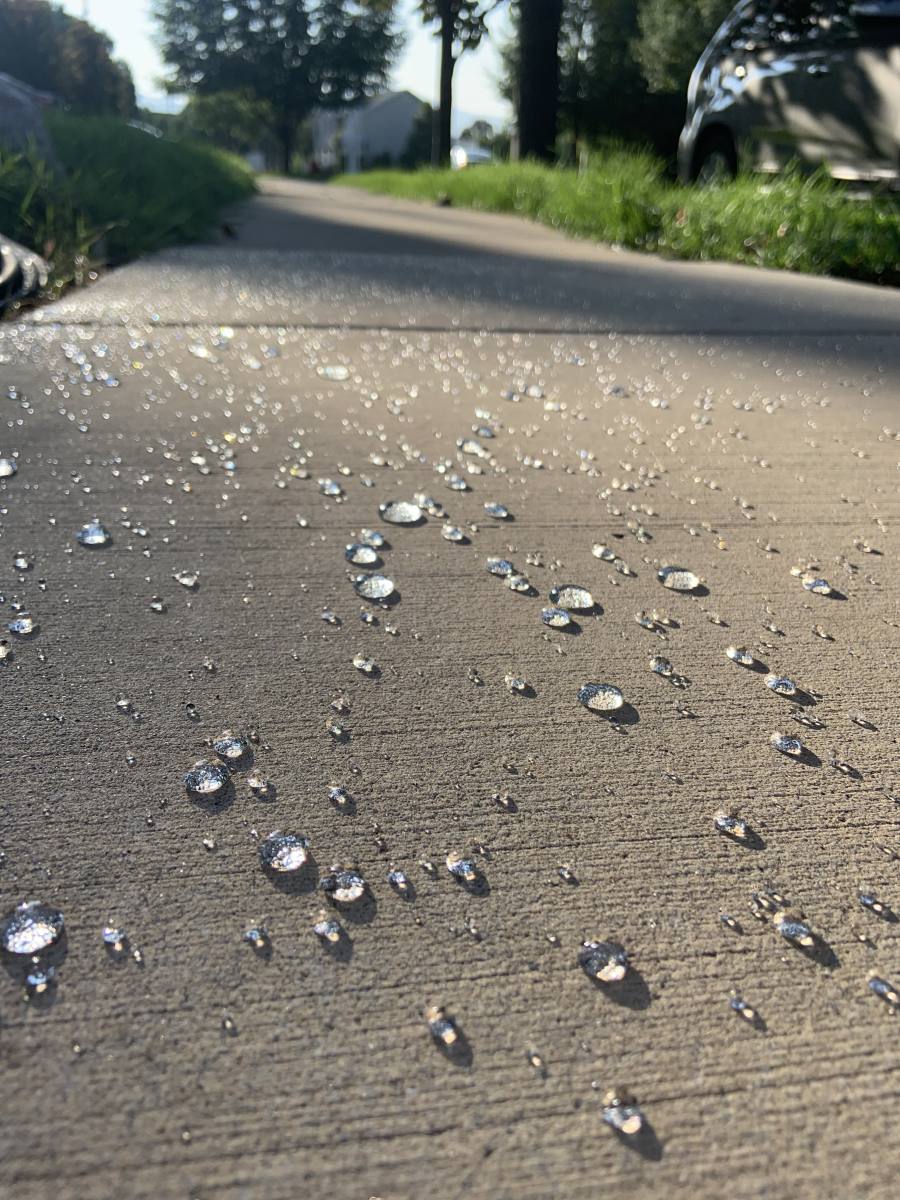
How do I know it’s time to reseal?
The simplest way to test your sealer to make sure it’s still effective is to pour water on the surface. An effective sealer should repel the water. If the water seems to soak into the surface, it’s probably time to reseal. For the most accurate test, make sure to pour water on several places on the surface in case there are any uneven spots.
Pro tip: You can use E-Etch as well. If it bubbles then its unsealed.
Can I seal my concrete driveway myself?
Yes, it is possible for a homeowner to seal their own driveway. However, keep in mind that sealing requires careful application, and it’s crucial to follow manufacturer instructions. You’ll also need the proper tools.
Also, if you don’t apply the sealer correctly, you could have issues. If its too hot it can bubble and blister. If not applied evenly or if there is moisture in the slab you can see discoloration. Proper application is important to ensure the concrete is well protected and looks nice.
How do I prepare a driveway for sealing?
Before sealing your driveway, you need to make sure that the surface is ready to accept the sealer so it adheres properly. Here’s a general overview of how to prepare your surface to apply a sealer:
- Remove debris with a leaf blower, broom, or hose.
- Address any stains. If you don’t resolve stains at this point, you will lock them in with the sealer.
- Use a cleaner to make sure grease and other contaminants are gone.
- If you’re working with bare concrete, use Brickform’s E-Etch. It is a strong, yet safe, cleaner that removes grease and efflorescence, and etches the surface.
- If you’re working with decorative concrete, you’ll want to use Brickform’s Neutra Clean, a pH neutral cleaner. This product will clean and lightly degrease your surface.
- To remove sealer or paint from a surface, use Brickform’s Strip-It. It is an environmentally friendly and safe stripper for both water- and solvent-based sealers and paints.
Explore Brickform Products to Find the Best Sealer for your Driveway
Brickform’s premium sealers bring out the natural beauty of the textures and colors unique to a decorative surface. Check out our line of sealers to find the sealer perfect for your concrete driveway project.
See More
